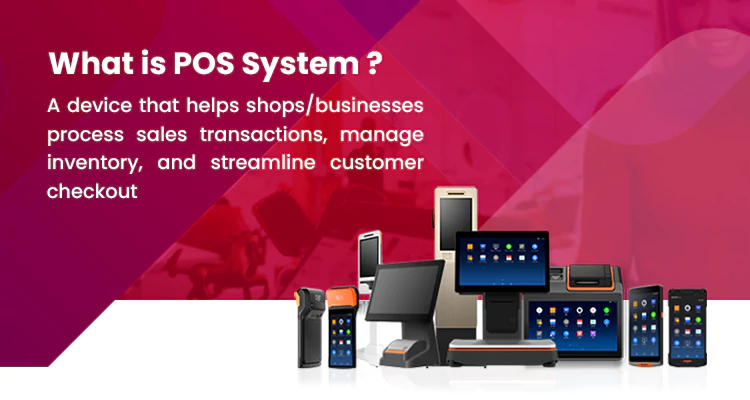What is POS System?

A POS system, or Point of Sale system, is a device that helps shops/businesses process payments. A POS, or Point of sale is where a customer comes to the checkout counter, transactions take place, and the purchase is complete. At this point, a POS system makes the transaction easy, which benefits both consumers and merchants.
In modern businesses, a POS system is crucial as it handles all kinds of operational aspects such as inventory management, customer information, and employee schedules, and it has become the central hub of processing sales, whether in a physical store, online, or on the go. Modern POS systems can streamline operations in any organization, enhance customer experiences, and provide valuable insights through data analytics.
What you’ll learn in this guide:
- Types of POS Systems
- Trending POS systems
- How Does POS System Work
- Key Features of POS Systems
- Benefits of Using a POS System
- How to Choose the Right POS System
- Common Challenges and Solutions
Types of POS Systems
Different types of POS systems are there in order to meet different kinds of requirements of various businesses. These types include Desktop POS systems, Mobile POS systems and Self-service kiosks.
Desktop POS systems
Desktop POS systems are commonly used by businesses that are in fixed locations, such as restaurants, retail shops, etc. Typically, it consists of a stationary computer or terminal equipped with POS software. These systems consist of a computer or terminal equipped with peripherals such as a cash drawer, receipt printer, barcode scanner, and sometimes a customer-facing display. These systems are suitable for businesses with complex needs because of their stability and functionality. However, their fixed nature can be restrictive, limiting mobility.
| ADVANTAGES | DISADVANTAGES |
|---|---|
|
|
Mobile POS systems
Mobile POS systems offer a flexible and portable solution ideal for businesses like food trucks, pop-up shops, and market stalls. Typically, these systems combine a mobile device with a Bluetooth or headphone jack-connected card reader and portable receipt printers. They also help with inventory management, sales tracking, and customer data collection. Integration with cloud-based services allows for real-time data updates and access from multiple devices.
| ADVANTAGES | DISADVANTAGES |
|---|---|
|
|
Self-service kiosks
Self-service kiosks are standalone terminals that enable customers to complete transactions independently and are commonly found in fast food restaurants, retail stores, and airports. These kiosks include a touchscreen display, card reader, receipt printer, and occasionally a barcode scanner or coin/bill acceptor. They are user-friendly, allowing customers to browse products, place orders, and make payments quickly and easily.
| ADVANTAGES | DISADVANTAGES |
|---|---|
|
|
Trending POS systems
A POS system helps businesses manage their operations easily. But you should choose the right one based on your business type, requirements, and budget. Here is a table that shows the popular POS systems under the categories of desktop POS systems, mobile POS systems, and self-service kiosks.
| Desktop POS Systems | Mobile POS Systems | Self-service Kiosks |
|---|---|---|
How Does POS System Work
A POS system or Point of Sale system streamlines the sales process by integrating hardware and software. When a customer makes a purchase, the system calculates the cost of the purchase, including any taxes or discounts. The system accepts payment via cash, debit/credit cards, or digital wallets. It updates inventory levels in real time after a successful transaction. This ensures accurate stock management. The POS system also records transaction data that can be used to generate sales reports, manage customer relationships, and perform financial accounting. This comprehensive functionality allows businesses to efficiently manage sales, customer data, and inventory. All kinds of POS systems work on POS software (POS applications)
Key Features of POS Systems
A POS system boasts a number of features that fulfill the requirements of every business organization, including retail shops, restaurants, the hospitality industry, the health industry, etc. These features help businesses streamline their operations and maintain profitable growth. From inventory management to integration with other software, POS systems are an effective tool for today’s modern businesses. Here are some of the features of POS systems:
- Record and analyze sales data.
- Generate detailed reports.
- Inventory Management
- Track stock levels.
- Automate reordering
- Customer Relationship Management (CRM)
- Store customer information.
- Track purchase history and preferences.
- Manage the schedules of employees.
- Track their performance and hours worked.
- Handle various payment methods.
- Ensure secure transactions.
- Integrate with other business applications.
Benefits of Using a POS System
Regardless of the size of the business, POS systems are always beneficial for all kinds of businesses. It can multiply your sales by enabling you to use the most modern technologies to streamline business operations. Here are some of the benefits offered by POS systems:
Improved Efficiency and Accuracy
- POS systems make the checkout process easy
- Reduces wait times and improves customer service.
- Minimizes the chances of mistakes, ensuring accurate transaction records.
Enhanced Customer Experience
- Helps with faster check-outs and a more pleasant shopping experience.
- Customer data stored in POS systems allows for tailored promotions and personalized interactions.
Better Inventory Control
- Automatically update inventory levels with each sale, providing real-time visibility into stock.
- Set thresholds for automatic restocking, ensuring you never run out of popular items.
Detailed Sales Analytics
- Generate comprehensive reports to analyze sales patterns, identify trends, and make data-driven decisions.
- Monitor the performance of products, promotions, and sales staff to optimize business strategies.
Simplified Accounting and Bookkeeping
- POS systems automatically record sales data
- Reduces the time and effort needed for manual bookkeeping.
- Accurate and organized records simplify the process of preparing and filing taxes.
Enhanced Security
- Ensures secure transactions by complying with industry standards
- Protects sensitive customer and business data
Improved Employee Management
- Easily create and manage employee schedules, track working hours, and monitor performance.
- Set different access levels for staff
Integration Capabilities
- Integrate with other business software, such as accounting, e-commerce platforms, and CRM systems
- As your business grows, POS systems can scale to meet increasing demands without compromising performance.
How to Choose the Right POS System
Here are some tips to choose the right POS system for your business
- Consider the current state of your business and its specific requirements. Create a deep insight into the features of the POS system you chose for your business.
- Prepare a budget and consider POS systems within it. Choose the one that suits your budget and meets your needs. Ensure that even a person with less technical expertise can operate the POS system.
- A tablet, card reader, or cash box is enough for small-scale businesses, and if you run a large-scale business, you can go for terminals, receipt printers, barcode scanners, or more.
- Check the ease with which software is used in POS systems.
- The POS system should have the capability to integrate with other vendors.
- Get recommendations for multiple POS systems and try them out.
- Evaluate whether the POS system adheres to the data security guidelines set forth by the Payment Card Industry (PCI).
You can refer to the blog named ‘How to Choose the Right Point of Sale (POS) System’ to learn more about the methods and tips to choose the right POS system for your business.
Common Challenges and Solutions
Investing in a POS system can be considered a necessity for every business. But they have to face many challenges when they buy a POS system. From budget to finding a supplier, they go through challenging situations. Let’s take a look at the common challenges and their solutions to buying the best POS system.
- Cost
- Integration Issues
- Finding a Supplier
Budget is an important factor to be considered for your POS system. As POS systems are an essential tool, every organization, shop, or store has to adopt the best one that suits their business purposes. But the budget stops most of them, especially startups and small business owners.
If budget is a problem for you, here is your solution. You can buy POS systems at the best price from Infome. Whether you need a desktop POS system or a mobile POS system, Infome offers the best price on all types of POS systems.
Infome has a subsidiary branch named Posinuae (posinuae.com). As the name suggests Posinuae is created exclusively for supplying POS in UAE where you can find the best POS systems at the best price compared to other suppliers. Here you will get a wide range of Desktop POS systems, Mobile POS systems, Self-service kiosks , and POS software for retail shops, grocery shops, restaurants, hospitality industry, healthcare industry etc.
Ensuring the POS system integrates seamlessly with existing business systems is a daunting task. If you already have a POS system, transferring data from an old system to a new POS can be complex and time-consuming. The solution is to choose the right POS software that can integrate with existing systems. As a dedicated wing for supplying POS in UAE, you will get the best POS software from Posinuae. The POS software we supply is best suited for various types of industries. Whether you run a restaurant, retail shop, salon, or any other business, you can find the best POS software within your budget that can integrate with existing systems.
POS systems are designed to foster business growth, so don't let them become a burden to your operations. Therefore, you should carefully choose a supplier who is genuine and loyal to providing the best solution for you. You can find a number of POS system suppliers on the market, but choosing the genuine one is important.
Your best solution is Infome Technologies LLC, where you can find top-quality, genuine, and affordable POS systems. Infome’s dedicated division, Posinuae, helps you find the best POS systems in the UAE. With our dedication and excellence in supplying the best products, Infome and Posinuae are now popular among the POS system suppliers in UAE. We have a committed team of experts to assist you in choosing the best one based on your budget and requirements. We also provide after-sales support and the fastest delivery possible. The POS systems we offer come with the option for customization. It helps you choose the best Point of Sale system tailored to your business.
You can contact Infome or Posinuae at +971 4 354 6020. Get ready for successful growth with the best Point of Sale systems.


